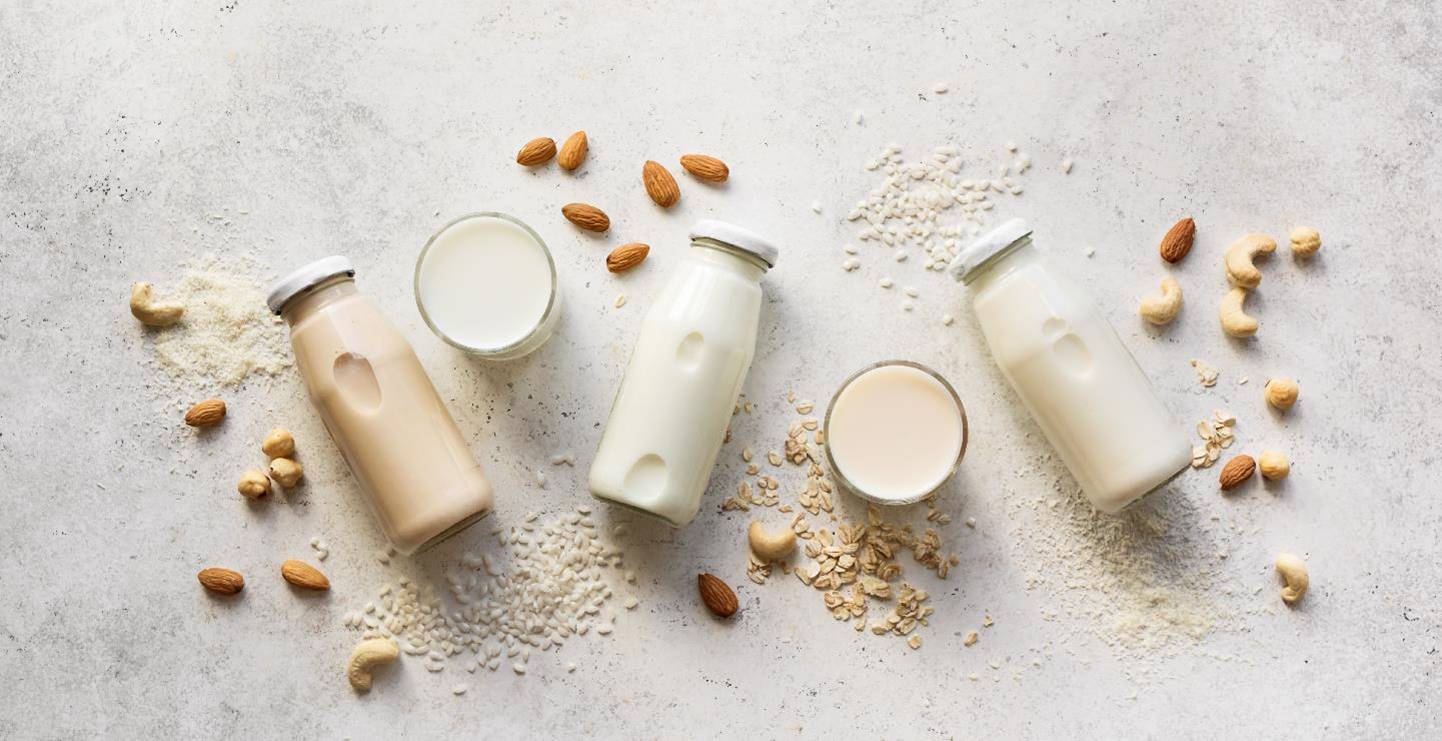The trends that have lasting power are the ones that resonate strongly with consumers, have solid scientific footing with clear benefits, and raise the level of benefit all around when it comes to participation. These are the key drivers that transition fads into trends and trends into the mainstream. Plant-based eating is just such a trend. The past decade has seen a shift in the buy-in by consumers to a lifestyle that includes more vegetarian choices on the daily menu.
Take a deeper look at plant-based protein solutionswith our White Paper, CLICK HERE!
Those consumers who have chosen to reduce their intake of animal products or forego them entirely has risen dramatically. The end of 2020 saw more than a third of Americans identifying themselves specifically as “flexitarians,” and nearly one in 10 consumers identifying as vegan or vegetarian, according to research group Packaged Facts. All in all, just under half of Americans fit into these groups.
Two dovetailing trends have helped to drive this sea change in how we eat: the health of our bodies and the health of the planet. The first is based on constantly mounting evidence for the benefit of a predominantly plant-based diet to healthy minds and bodies. The second is exemplified by the now-global concern for the ecology and immediate impacts of climate change revealing themselves almost daily.
Accelerating the adoption of a more plant-centered diet is the leaps in technology by ingredient and product manufacturers that have allowed for the creation of meat and dairy analogs that so closely mimic their animal-derived counterparts they make it easy for slow or late-adopting consumers to buy into the trend with greater ease and virtually no sacrifices. This has been especially true of dairy replacement beverages.
With a longer track record than substitutes for meat, poultry, and seafood, dairy replacers benefit from decades of development as they also serve the large population of lactose intolerant and lactose sensitive individuals. It should be noted that this population has experienced a sharp increase in Western populations as these countries have become more diverse and experienced influxes of new residents from countries where issues with lactose digestion are high, specifically Africa, Asia, Latin America, and the Middle East. As an example, according to research by ProCon, a division of Encyclopedia Britannica, more than a third of the population of the United States suffers from some form of lactose malabsorption.
Serving two distinct yet large populations has allowed plant-based dairy beverage development the benefit of technologies that brought dozens of excellent plant milk choices to the table. The key ingredient in this technology has been plant-derived proteins. Proteins provide not only the nourishment of dairy milk but the mouthfeel, performance, and texture. Recent advances in plant proteins have led to a surge in new entries that have demonstrated superior qualities that brought about a recent surge in dairy replacement beverages from plants as consumers make such beverages a staple in their nutritional regimen.
Milking a Trend
The number of consumers choosing plant-based dairy beverages has been growing at an unprecedented rate. According to Mintel, non-dairy milks experienced 54% growth from 2015-19. And recent events have driven sales even higher, with 2020 alone seeing a further 20% jump in sales, driven largely by the shifts in consumer behaviors that led to most meal occasions occurring in the home and the seeking of foods and beverages products that wear a halo of health and functional benefits.
 Predictions by multiple expert sources are that annual growth in the category are only going to continue this upward, double-digit trajectory, reaching at least $40B worldwide over the next two years. So, who is most conscientiously buying into the dairy beverage replacement trend? In an analysis of the typical non-dairy beverage consumer, Symrise Group conducted a comprehensive consumer and market insights survey on plant-based milks and creamers, the consumers who use them, and what drives these consumers’ choices.
Predictions by multiple expert sources are that annual growth in the category are only going to continue this upward, double-digit trajectory, reaching at least $40B worldwide over the next two years. So, who is most conscientiously buying into the dairy beverage replacement trend? In an analysis of the typical non-dairy beverage consumer, Symrise Group conducted a comprehensive consumer and market insights survey on plant-based milks and creamers, the consumers who use them, and what drives these consumers’ choices.
This research, conducted in North America, explored the attitudes, consumption behaviors, and purchasing motivators of US consumers regarding plant-based protein products. The goal was to establish a more comprehensive innovative pipeline along lines that support markets and customers, while serving the consumer demands driven by social megatrends.
The online survey utilized custom primary research questions on a targeted demographic of 2,000+ US consumers, demarked by age, gender, ethnic background, and regional location quotas based on US Census Bureau statistics. The pool was chosen to provide a balanced customer spectrum that includes a healthy customer mix of global, regional, and local customers. Care was exercised to ensure that no single customer type represented more than 5% of group sales. Findings are as follows.
Stay in the loop with the latest plant-based innovations, join In-sight!
The Planted Based Milk Consumer
Mom and dad know best. Parents are more likely than non-parents to buy non-dairy milk, even as consumers of all ages associate dairy milk with being good for kids. In fact, nearly two-thirds of Millennial parents (61%) regularly purchase non-dairy milk. These Millennial parents are specifically seeking milk replacers that contain added protein, probiotics, and omega-3 fatty acids.
Among GenZ non-dairy milk buyers, there still is a very positive association with non-dairy milks, but they do not tend to have strong negative opinions of dairy milk. Nearly two thirds of this group of non-dairy milk buyers associates non-dairy milk with being nutritious. Moreover, predictions are that sales of non-dairy milks will increase as more GenZ become the primary shopper for themselves. Interestingly, GenZ are more likely to use non-dairy milk as a creamer or as a post workout drink.
Plant Milk Occasions
In the survey, it was revealed that breakfast is the top occasion for non-dairy milk and non-dairy creamer consumption, with both these product types showing near-identical figures for choices at all occasions. Yet, the number of consumers using them outside of breakfast at other main meal and snacking occasions drops by almost half. There also was a decrease in consumption (by about a third) during weekend breakfast.
When it comes to how, specifically consumers are using these dairy alternatives, the main use of plant-based milks is as an additive—most typically consumed in cold cereal (58%), coffee (56%), and smoothies or shakes (51%). About 44% of consumers are turning to plant milks as a substitute for a simple glass of milk, and more than a third (35%) are employing a plant milk as an ingredient in cooking a meal or in oatmeal.
Even as a baking ingredient, non-dairy milk is used almost a third of the time (30%). Just more than a quarter are using plant milk to make hot chocolate (27%), and one in five are adding it to their tea. Interestingly, when it comes to serving their children plant-based milk, only 17% are doing so. So far, a mere 6% of consumers think to grab a serving of plant-based milk as an on-the-go beverage.
Surprisingly, one in six consumers turn to plant milks as a post-workout drink. Protein has proven to be a key ingredient active and athletic consumers seek when replenishing after a workout, and traditional sports beverages have relied on dairy proteins. This opens up great opportunities for product developers to develop next-generation “muscle milks” using plant protein-based dairy beverage replacements.
Unlock Taste for Alternative Protein in our White Paper, download it here!
Cash Cows
Almond is entering its 10th year as the most popular non-dairy choice, with no close second. It is consumed by more than eight in 10 respondents (81%) in the Symrise survey. This figure is almost twice as much as the next three favorites, coconut (48%), soy (47%), and oat (38%). It should be noted, however, that in just the one year since this survey was taken, sales of refrigerated oat-based plant milks increased more than 350%, according to data gathered in late 2020 by the research group SPINS. Sales of shelf-stable versions more than doubled in that time as well.
Overall, almond milk now owns about two-thirds (63%) of the total non-dairy milk market. Almond milk sales are around $1.5B per year. Soy milk, once No. 1, has just over $200M in sales, continuing a steep decline, and was edged out of second place by oat milk. Surprisingly, cashew milk is coming up fast, with 30% of respondents enjoying this form of plant milk. Hazelnut, rice, flaxseed, hemp made the Top Ten as well, but were much further down the list of preferred dairy milk replacers.
Creating Next-Generation Plant-Based Dairy
With the majority of consumers (70%) expecting—demanding—that the appearance and texture of plant-based milks and creamers equal or surpass that of dairy versions of these products, and more than half (56%) expecting the flavor to do so, developers of plant-protein beverages face a number of challenges. This indicates that when creating plant-based milks, creamers, or similar dairy-replacement beverages, product developers should continue to optimize the sensory properties to ensure they match the dairy counterparts as closely as possible.
Ingredients, flavor, and sweetness may be polarizing and alternatives may be needed in the market. Therefore, the opportunity is there for flavor and sweetness alternatives to act as strategies for guiding successful formulations. Symrise Flavor North America, centered outside of New York City in Teterboro, New Jersey, has nearly two decades of global expertise in flavor solutions, including taste modulation and sugar reduction.
Vanilla has proven to be one of the most adept flavors at both recreating the natural sweetness of dairy milk and creamers to masking any off flavor notes that some plant proteins can contribute. And from vanilla to taste balancing technologies, Symrise utilizes its plant-based application know-how to achieve top flavor performance in multiple bases and segments.
In looking at plant-based milks and creamers, the Symrise survey took a deep dive into consumer choices and preferences by type of plant milk and occasions. With its proprietary “Veganilla” toolbox, natural fruit powders, and functional ingredients, the Symrise team of experts partners with customers to offer the best taste performance in tailor-made solutions. Using its Taste for Alternative Protein (TAP) initiative, the group is fully geared toward developing ingredient solutions for products not only in the dairy alternative and nutritional beverage categories but in the meat alternative channel as well.
RELATED: Market for Plant-Based Proteins Ignites
When it comes to development of plant-based dairy beverages, Symrise’s key partner, Califormulations in Laguna Beach, California (with a 100,000 square-foot flexible, multipurpose space for beverage development, bottling, and shelf-ready scalable packaging in Columbus, Georgia) is the partner of choice to inspire creativity in developing beverage prototype concepts for established beverage manufacturers and start-ups.
At Califormulations, the development model is built on a rapid product innovation approach, one starting with Insights & Design, leading toward Prototyping & Development, and feeding ultimately into full production—all while employing an activation ecosystem approach designed to ensure beneficial conditions for maintaining ecological integrity.
Ecological integrity also extends to the packaging itself, with an aseptic blow-fill-cap system that meets the most demanding requirements of product sensitivity. The ecological packaging approach also involves flexible packaging machine partners and front-end activation specialists.
The plant can produce up to 24,000 bottles per hour, 100 million+ bottles per year. Shelf-stable products are available in a full range of transparent PET packaging sizes. The Georgia facility is FDA PoC (Point of Care) approved, and holds a range of existing certifications, including Brewers and Distilled Spirit permits, and is located hours from the port of Savannah with direct distribution routes, thus saving on transportation costs.
The synergy of Symrise with the Califormulations group brings together insights and innovations, coupled with pinpoint flavor design expertise, that come together create winning taste solutions. The group offers a “Best in Class” portfolio of flavoring solutions designed specifically to work efficiently in plant-based beverages, supporting an end-to-end Beverage innovation platform. These feed seamlessly into prototyping and scale-up that are advanced with internal production capability.
Symrise’s truly agile business model allows developers to bring new ideas to fruition, from ideation to shelf. And, with sustainability near the top of consumers’ priority list, the team has adopted an ecosystem based approach—no water consumption is used during production—partnering with industry-leading packaging and ingredients manufacturers to promote sustainability.
Here at Symrise Flavor North America, we hosted three separate Taste for Alternative Protein webinars to support the three main units of the food and beverage industry: beverage, savory and sweet. If you're interested in learning more about our Taste for Alternative Protein solutions, watch the on-demand webinar that best fits your category of focus:
• Beverage: Beverage Innovation in a Plant-Based World
• Savory: Key Opportunities & How to Succeed in a Plant-based World
• Sweet: Plant-based Demand Transforms Sweet Categories
If you're already familiar with our plant-based solutions and would like to take the next steps with Symrise, click here to reach out to a member of our team!






